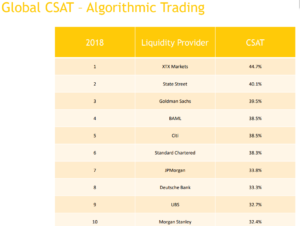“Mind The Gap!” – The life and times of a man on the move Episode 70
Why WeWork doesn’t work, and an interesting perspective on why Tier 1 bank prime brokerages are really pulling back on OTC electronic trading, and it’s nothing to do with risk

In this weekly series, I look back on what stood out, what was bemusing, amusing and interesting during my weekly travels, interesting findings within the FX industry and interaction with an ever-shrinking big wide world. This is purely observational and for your enjoyment.
Is WeWork the challenger bank of the office space world?
I suppose it was inevitable. WeWork’s massive and very quickly attained success was something of an anomaly, especially to those who remember its relatively humble, annoyingly edgy, hipster-orientated origins in the sordid back streets of Tel Aviv.
Like most large ventures that rise to prominence that are used by the Israeli propaganda movement to inappropriately and unnecessarily laud the perceived technological and social advancements which the general public, venture capitalists and mainstream news sources are supposed to believe without even a hint of question, WeWork is actually American in its ownership and structure.
We have all heard the banal claims before, such as the invention of the Intel x86 processor and the cellular telephone, both used by similar types who considered WeWork to be a revolutionary entity emanating from the most corruption-ravaged, poorest and least socially developed country in the OECD nations by a very large margin, to state that these were Israeli inventions, when actually none of them are.
Perhaps WeWork’s most odious facet is its sole Israeli component, Adam Neumann, who has dominated business headlines over the past few weeks as the cracks in what was supposed to be a new method of working show through in an age of remote working from home, away from the garish pool tables and strange facsimiles of Google Campus premises such as bean bags.

A visitor to a communist Kibbutz may be comfortable about being asked to sit on a bean bag, your future customer would probably not.
WeWork’s sudden negative exposure can be attributed to just a few metrics and some litigation, which of course can happen to any company of this size at any time.
The important thing here is that WeWork is relatively new. It is not Barclays Bank or UBS, 400 year old institutions who behave impeccably in the boardroom, hence their wranglings in the courts recently have been the result of employees fiddling the LIBOR rate or FX benchmarks by abusing Bloomberg messenger, unbeknown to their employers.
WeWork’s issues are far more entrenched in its leadership. In terms of performance, WeWork’s August 24, 2019 SEC filing states that the company faces substantial risk in the event of an economic downturn: “…we have yet to experience a global economic downturn since founding our business”, and “an economic downturn or subsequent declines in market rents may result in increased member terminations and could adversely affect our results of operations”, because the company has $47 billion of future lease obligations and only $4 billion of future lease commitments.
This a very important analysis to consider. Currently. the FX and CFD industry is facing a competitive onslaught from challenger banks, often started by young executives under 40 who have been on the sales desk at a Tier 1 bank prime brokerage in Canary Wharf, or who have been a systems engineer at HSBC.
Very smart people indeed, without the perceived arrogance and odiosity of WeWork’s swaggering Adam Neumann, but the hysteria is the same. Venture capital funds are literally throwing money at companies such as Starling Bank, and we have seen Aritra Chakraborty’s Dozens gain rounds of funding into the tens of millions recently.
Advertisements are all over the billboards and the London Underground, and the perception among its target is that the big banks are done, and this is the way forward.
Well, it would be the way forward if these had any money. In the hype, a matter of important fact has been lost. Challenger banks are there to challenge the status quo, which is great. I am all for innovation, however they have no money. They run out of funding, then just simply go for another round. People are placing their business and personal assets onto an iPhone application which has no capital, and then being disparaging about the gray-suited bank that they left in order to take such a risk.
When the VC runs out, we will see who really challenges the banks. The massive WeWork trendiness never attracted me, I see it as a pointless exercise when people can work or study from home. It is like charging a monthly rate to sit in a student union coffee shop and is a classic case of the Emperor’s New Clothes.
Challenger banks are indeed offering portfolios to the young, app-based generation, but what will happen when the VC dries up and they have to write off customers cash flow above the FSCS ceiling of £85,000 per customer?
VC funding is not a gift, it is a shareholder loan and has to be repaid. No VC is given just so that its investor can take shares. They want repayments too, and usually within 5 years. It is quite common for VCs to actually close down firms that do not pay their capital back to mitigate risk, and if you are a business with a substantial amount of capital in there, you will see that go down to £85,000 very quickly.
At least when Fred Goodwin, probably the world’s most arrogant bank executive, contributed to the demise of RBS, one of the world’s largest banks in 2008, there was recourse. The government stepped in – and no of course I am not an advocate of nationalization, it is a terrible way to operate, but the British government knew it would get its money back and at the same time was able to support millions of small and large businesses, safeguard the assets of retail investors and keep the bank’s at the time massive FX prime brokerage towering above the docks in Canada Square.
The government did get its money back and all is well. Nobody felt a thing.
Going back to the issues with regard to WeWork, as of June 2019, three former executives were at various stages of suing WeWork, one alleging age discrimination, one alleging sexual harassment claims that resulted in retaliation, and one alleging retaliation for filing a complaint that women were paid less.
In October 2019, Medina Bardhi, the former chief of staff for Adam Neumann, sued The We Company over various allegations including a gender pay gap, marijuana use by company executives, and pregnancy.
Sounds like a binary options sales floor, most of which also originated from the same litter-strewn dusty backstreets as WeWork did.
So, in conclusion. Do I want to sit on a bean bag? No I don’t.
Bank Prime Brokerage gets cold feet
I know that I have made a significant point of this and gone into rambling detail about it in the past, however I would like to very briefly share something that I found out this week which adds to it.
Since 2015, when I made it public that Citigroup, which at the time was the largest Tier 1 interbank FX prime brokerage by market share in the world and had been for over 12 years prior to that, issued an internal notice that it expected all extension of counterparty credit to OTC derivatives firms – ie liquidity takers in the FX business – to result in a 56% default rate.
This struck fear into other banks as they got to find out about it via the official memorandum being circulated within the FX prime brokerage industry and many began curtailing credit to OTC liquidity takers by following in Citigroup’s footsteps.
I met this week with some senior interbank FX Prime Brokerage executives, who told me that this is now the case once again, however this time it is RBS and ABN AMRO that are doing it.

ABN AMRO does not have the best reputation as an interbank dealer which is good for the FX business, and is a long way down the league table in terms of market share, however RBS is a mainstay, its NatWest Markets division having reached out to our entire industry in 2017 to herald itself as the ‘friendly’ Tier 1 prime brokerage which actually wants OTC derivatives counterparty business.
This was very much the highlight of a face to face conversation with the incumbent head of FX Prime Brokerage at RBS during my visit to their office in Bishopsgate in the summer of 2017.
Now, however, the tables have turned but my suspicion is that there is more to this than meets the eye.
It is very easy to cite risk, or the potential mismanagement of risk, as a reason for Tier 1 banks not to extend credit for trading, however I am quite sure that this is not a risk issue at all, but a bottom line issue.
Today, we should be proud that the OTC electronic trading industry has built up a whole range of services which brokers can connect to via an API, which manage risk, such as IS Risk Analytics, part of London-based prime of prime brokerage IS Prime, or intelligent order routing and management systems from specialists such as oneZero or Integral Development Corporation which have been specifically designed to include OMS solutions for retail dealers.
The banks are surely not afraid of risk.
They are giving way to the non-bank market makers purely because of cost and ROI. The regulatory wrangling that is currently in place has either encouraged B-booking (a retrograde step) or caused some brokerages to head to offshore regions (another retrograde step) which in turn means that they can offer all sorts of non-compliant trading terms, not bother using order management systems and not pass trades to their prime brokerage at all.
I have even seen some of these smaller retail firms going back to offering bonuses and massive leverage now that they are offshore, which is not a good thing to see.
None of these will use a prime brokerage for what it is intended for – trade execution via a bank desk. They will simply take a price feed, often given for free by a prime of prime on the premise that trading volume would be processed via the banks and a commission business would operate.
During my meeting this week, one of the Tier 1 bank executives agreed with me on this, saying “prime brokerage is a commission and volume business. It is not worth just being a pricing provider.”
Hence, Jump and XTX Markets are now at the top of the tree when it comes to FX market share. I know a prime of prime expert in New York who a few years ago told me he would rather use these non bank entities, or HotspotFX et al than the banks for the reason that the orders are filled quickly, cheaply and there is no nickel and diming or rejections via last look execution, and no constant boardroom diatribe as to whether a $5 trillion per day business is actually going to see its way to the banks.
Thus, we have to raise our hats to the existing 6 prime of prime brokerages that operate worldwide as this is a very important part of the industry that only they get right.
I do see in future that many of the 6 very good quality firms – those being Advanced Markets, CFH Clearing, IS Prime, Saxo Bank, Swissquote and Invast Global – will be the de facto venues for brokers who want to provide live execution for their clients, and I see within those aggregated price feeds, a greater dominance of companies like XTX Markets giving good service to these prime of prime brokers.
After all, XTX Markets and its non-bank market making rivals understand our industry properly and do what the banks are supposed to be doing – making a market that our clients want to trade via good quality existing prime of prime liquidity.
Wishing you all a super week ahead!









